Multinational Companies, National Differences, and State Response
VerifiedAdded on 2023/01/18
|14
|3750
|68
Essay
AI Summary
This economics essay examines the strategies multinational companies (MNCs) employ to exploit national and regional differences in culture and regulation. It delves into how various host countries provide location advantages for different types of inward investment, considering economic, political, and social factors. The essay discusses the ways in which MNCs navigate and cope with governmental regulations, emphasizing the strategic plans of MNCs, including outsourcing and foreign direct investment (FDI). It explores policy measures governments can take to mitigate issues arising from MNC operations, including the role of national culture and the benefits developing countries can gain from FDI. The essay also highlights strategies for attracting quality FDI and promoting economic growth. The content provides a comprehensive overview of the economic implications of MNCs and their interaction with host countries, including factors influencing location advantages and the balance of power between MNCs and governments.
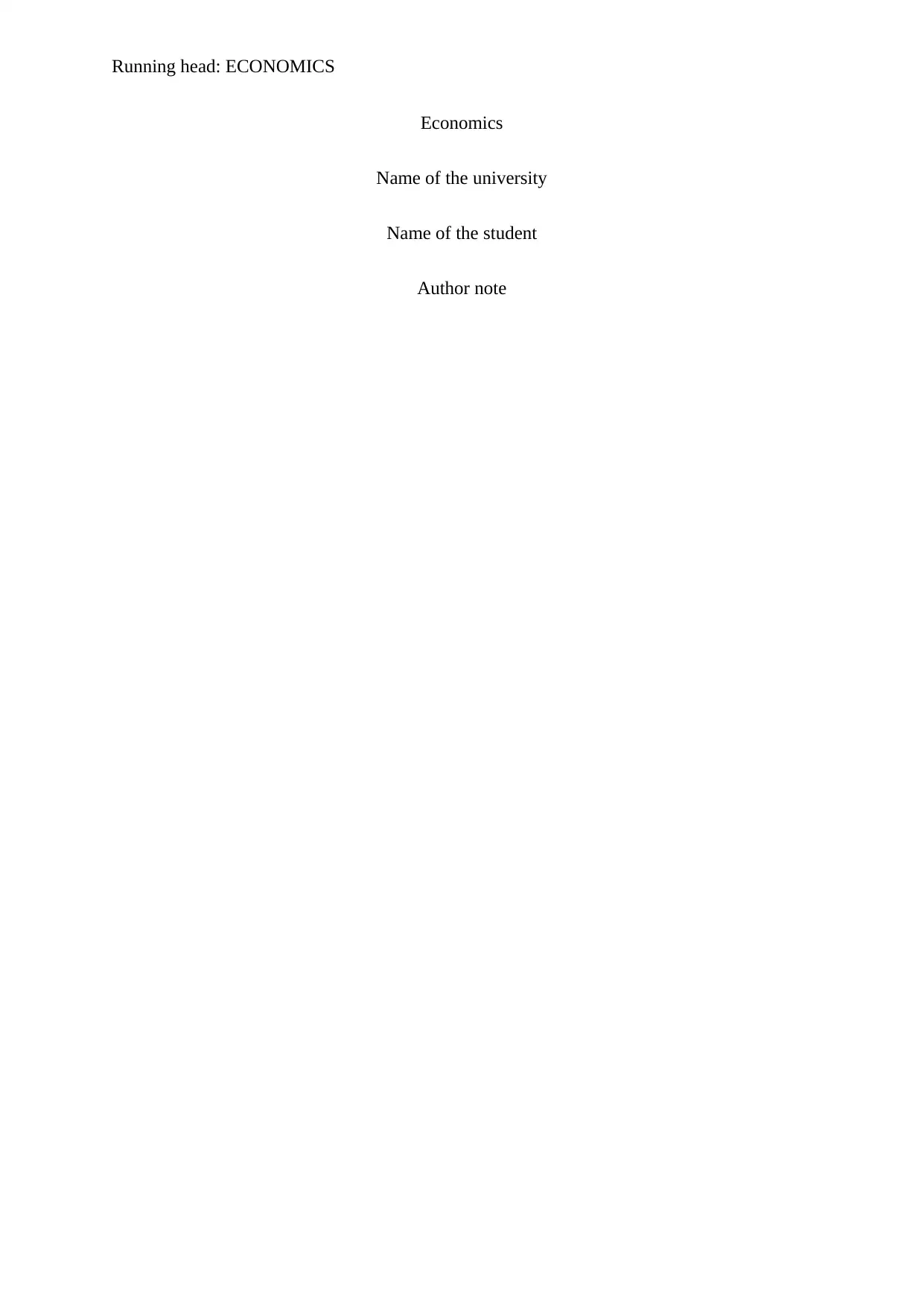
Running head: ECONOMICS
Economics
Name of the university
Name of the student
Author note
Economics
Name of the university
Name of the student
Author note
Paraphrase This Document
Need a fresh take? Get an instant paraphrase of this document with our AI Paraphraser
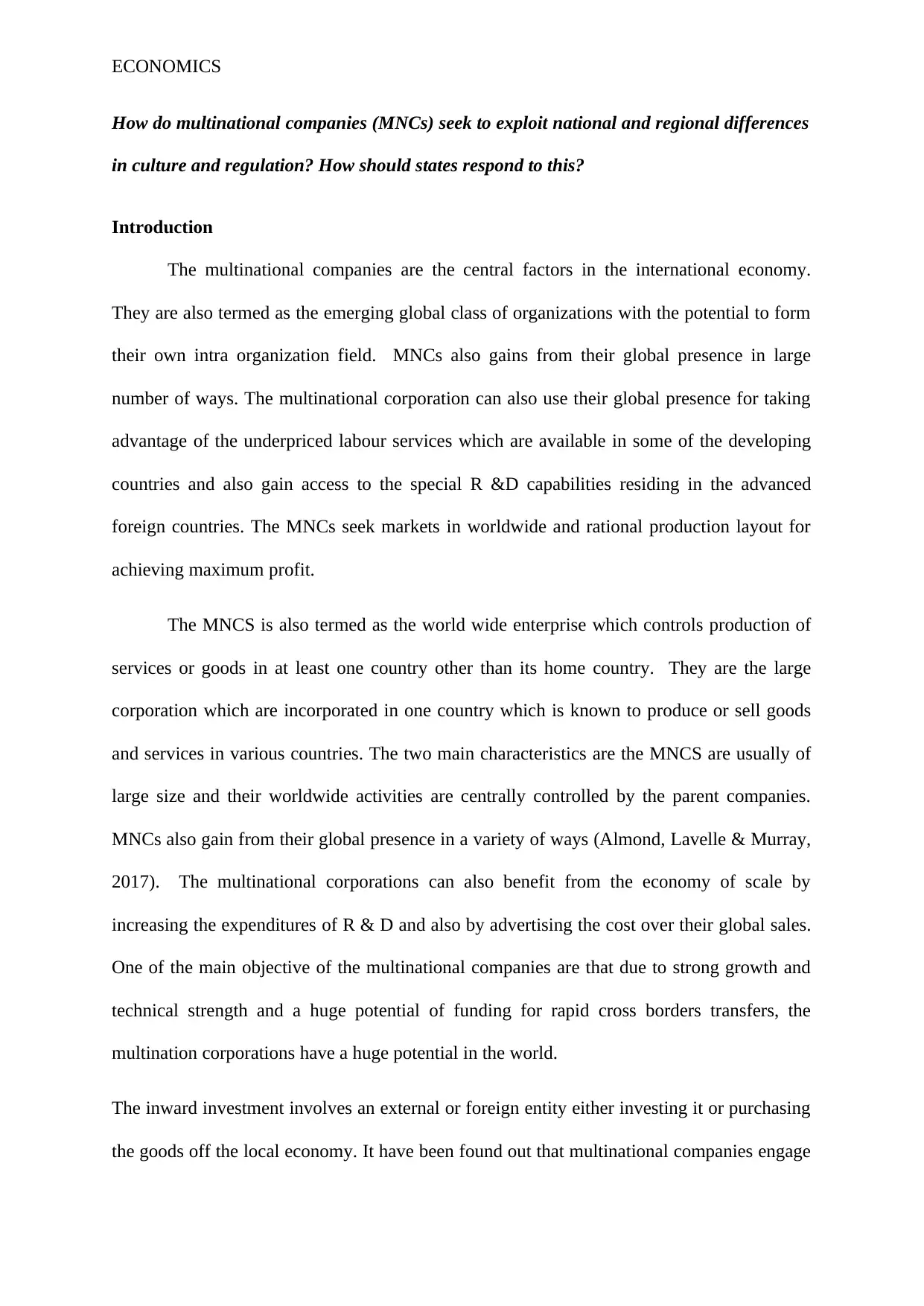
ECONOMICS
How do multinational companies (MNCs) seek to exploit national and regional differences
in culture and regulation? How should states respond to this?
Introduction
The multinational companies are the central factors in the international economy.
They are also termed as the emerging global class of organizations with the potential to form
their own intra organization field. MNCs also gains from their global presence in large
number of ways. The multinational corporation can also use their global presence for taking
advantage of the underpriced labour services which are available in some of the developing
countries and also gain access to the special R &D capabilities residing in the advanced
foreign countries. The MNCs seek markets in worldwide and rational production layout for
achieving maximum profit.
The MNCS is also termed as the world wide enterprise which controls production of
services or goods in at least one country other than its home country. They are the large
corporation which are incorporated in one country which is known to produce or sell goods
and services in various countries. The two main characteristics are the MNCS are usually of
large size and their worldwide activities are centrally controlled by the parent companies.
MNCs also gain from their global presence in a variety of ways (Almond, Lavelle & Murray,
2017). The multinational corporations can also benefit from the economy of scale by
increasing the expenditures of R & D and also by advertising the cost over their global sales.
One of the main objective of the multinational companies are that due to strong growth and
technical strength and a huge potential of funding for rapid cross borders transfers, the
multination corporations have a huge potential in the world.
The inward investment involves an external or foreign entity either investing it or purchasing
the goods off the local economy. It have been found out that multinational companies engage
How do multinational companies (MNCs) seek to exploit national and regional differences
in culture and regulation? How should states respond to this?
Introduction
The multinational companies are the central factors in the international economy.
They are also termed as the emerging global class of organizations with the potential to form
their own intra organization field. MNCs also gains from their global presence in large
number of ways. The multinational corporation can also use their global presence for taking
advantage of the underpriced labour services which are available in some of the developing
countries and also gain access to the special R &D capabilities residing in the advanced
foreign countries. The MNCs seek markets in worldwide and rational production layout for
achieving maximum profit.
The MNCS is also termed as the world wide enterprise which controls production of
services or goods in at least one country other than its home country. They are the large
corporation which are incorporated in one country which is known to produce or sell goods
and services in various countries. The two main characteristics are the MNCS are usually of
large size and their worldwide activities are centrally controlled by the parent companies.
MNCs also gain from their global presence in a variety of ways (Almond, Lavelle & Murray,
2017). The multinational corporations can also benefit from the economy of scale by
increasing the expenditures of R & D and also by advertising the cost over their global sales.
One of the main objective of the multinational companies are that due to strong growth and
technical strength and a huge potential of funding for rapid cross borders transfers, the
multination corporations have a huge potential in the world.
The inward investment involves an external or foreign entity either investing it or purchasing
the goods off the local economy. It have been found out that multinational companies engage
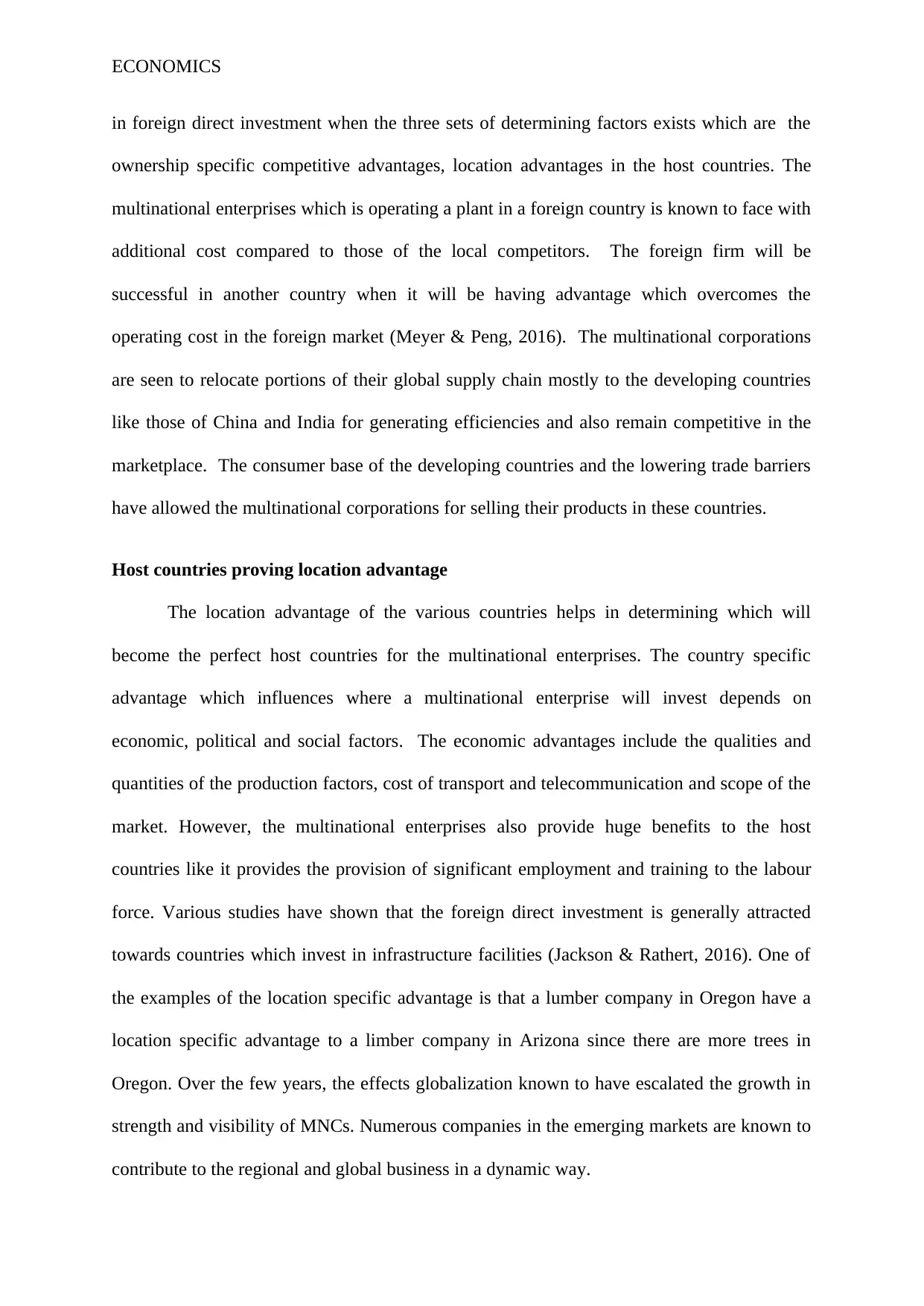
ECONOMICS
in foreign direct investment when the three sets of determining factors exists which are the
ownership specific competitive advantages, location advantages in the host countries. The
multinational enterprises which is operating a plant in a foreign country is known to face with
additional cost compared to those of the local competitors. The foreign firm will be
successful in another country when it will be having advantage which overcomes the
operating cost in the foreign market (Meyer & Peng, 2016). The multinational corporations
are seen to relocate portions of their global supply chain mostly to the developing countries
like those of China and India for generating efficiencies and also remain competitive in the
marketplace. The consumer base of the developing countries and the lowering trade barriers
have allowed the multinational corporations for selling their products in these countries.
Host countries proving location advantage
The location advantage of the various countries helps in determining which will
become the perfect host countries for the multinational enterprises. The country specific
advantage which influences where a multinational enterprise will invest depends on
economic, political and social factors. The economic advantages include the qualities and
quantities of the production factors, cost of transport and telecommunication and scope of the
market. However, the multinational enterprises also provide huge benefits to the host
countries like it provides the provision of significant employment and training to the labour
force. Various studies have shown that the foreign direct investment is generally attracted
towards countries which invest in infrastructure facilities (Jackson & Rathert, 2016). One of
the examples of the location specific advantage is that a lumber company in Oregon have a
location specific advantage to a limber company in Arizona since there are more trees in
Oregon. Over the few years, the effects globalization known to have escalated the growth in
strength and visibility of MNCs. Numerous companies in the emerging markets are known to
contribute to the regional and global business in a dynamic way.
in foreign direct investment when the three sets of determining factors exists which are the
ownership specific competitive advantages, location advantages in the host countries. The
multinational enterprises which is operating a plant in a foreign country is known to face with
additional cost compared to those of the local competitors. The foreign firm will be
successful in another country when it will be having advantage which overcomes the
operating cost in the foreign market (Meyer & Peng, 2016). The multinational corporations
are seen to relocate portions of their global supply chain mostly to the developing countries
like those of China and India for generating efficiencies and also remain competitive in the
marketplace. The consumer base of the developing countries and the lowering trade barriers
have allowed the multinational corporations for selling their products in these countries.
Host countries proving location advantage
The location advantage of the various countries helps in determining which will
become the perfect host countries for the multinational enterprises. The country specific
advantage which influences where a multinational enterprise will invest depends on
economic, political and social factors. The economic advantages include the qualities and
quantities of the production factors, cost of transport and telecommunication and scope of the
market. However, the multinational enterprises also provide huge benefits to the host
countries like it provides the provision of significant employment and training to the labour
force. Various studies have shown that the foreign direct investment is generally attracted
towards countries which invest in infrastructure facilities (Jackson & Rathert, 2016). One of
the examples of the location specific advantage is that a lumber company in Oregon have a
location specific advantage to a limber company in Arizona since there are more trees in
Oregon. Over the few years, the effects globalization known to have escalated the growth in
strength and visibility of MNCs. Numerous companies in the emerging markets are known to
contribute to the regional and global business in a dynamic way.
⊘ This is a preview!⊘
Do you want full access?
Subscribe today to unlock all pages.

Trusted by 1+ million students worldwide
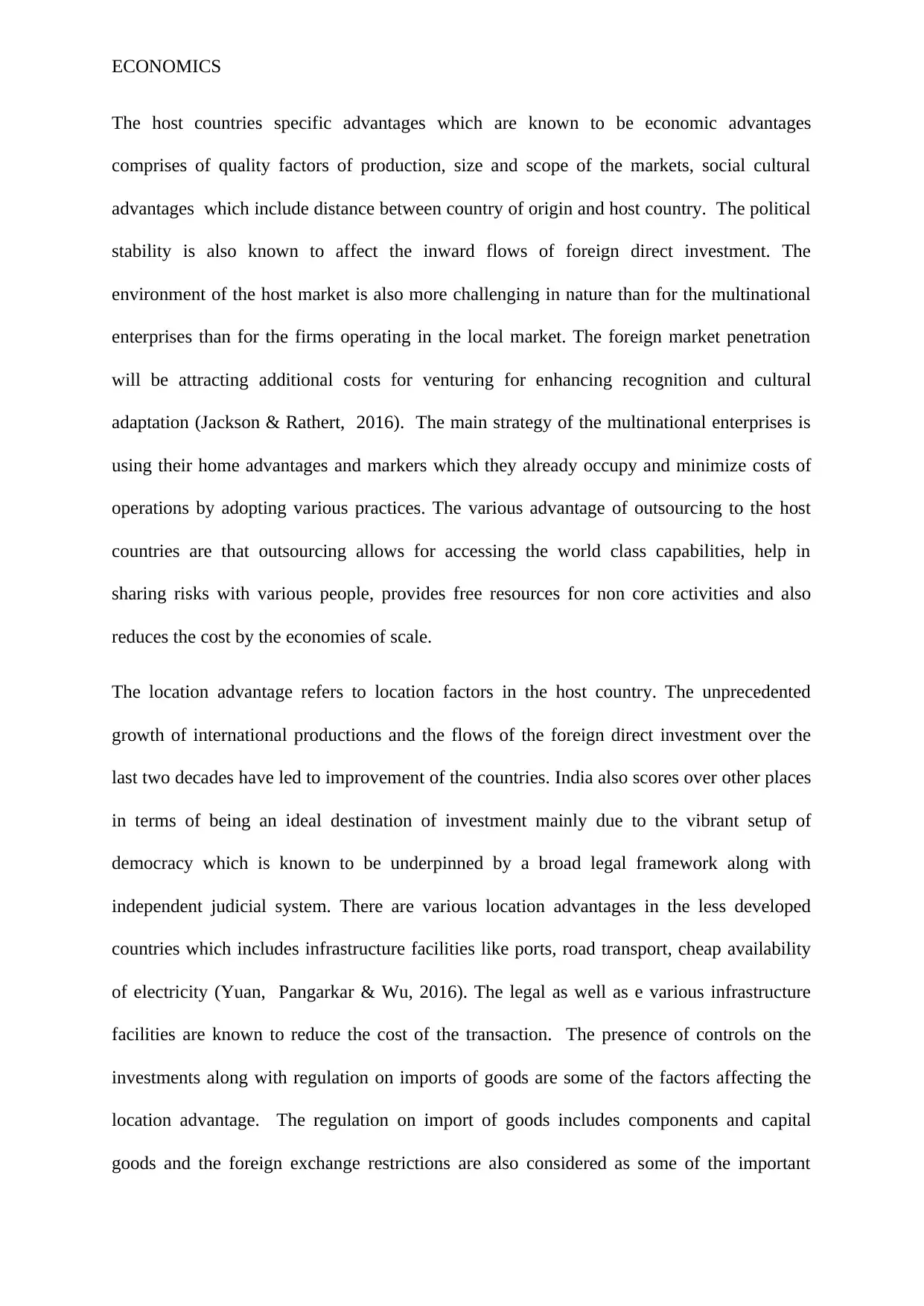
ECONOMICS
The host countries specific advantages which are known to be economic advantages
comprises of quality factors of production, size and scope of the markets, social cultural
advantages which include distance between country of origin and host country. The political
stability is also known to affect the inward flows of foreign direct investment. The
environment of the host market is also more challenging in nature than for the multinational
enterprises than for the firms operating in the local market. The foreign market penetration
will be attracting additional costs for venturing for enhancing recognition and cultural
adaptation (Jackson & Rathert, 2016). The main strategy of the multinational enterprises is
using their home advantages and markers which they already occupy and minimize costs of
operations by adopting various practices. The various advantage of outsourcing to the host
countries are that outsourcing allows for accessing the world class capabilities, help in
sharing risks with various people, provides free resources for non core activities and also
reduces the cost by the economies of scale.
The location advantage refers to location factors in the host country. The unprecedented
growth of international productions and the flows of the foreign direct investment over the
last two decades have led to improvement of the countries. India also scores over other places
in terms of being an ideal destination of investment mainly due to the vibrant setup of
democracy which is known to be underpinned by a broad legal framework along with
independent judicial system. There are various location advantages in the less developed
countries which includes infrastructure facilities like ports, road transport, cheap availability
of electricity (Yuan, Pangarkar & Wu, 2016). The legal as well as e various infrastructure
facilities are known to reduce the cost of the transaction. The presence of controls on the
investments along with regulation on imports of goods are some of the factors affecting the
location advantage. The regulation on import of goods includes components and capital
goods and the foreign exchange restrictions are also considered as some of the important
The host countries specific advantages which are known to be economic advantages
comprises of quality factors of production, size and scope of the markets, social cultural
advantages which include distance between country of origin and host country. The political
stability is also known to affect the inward flows of foreign direct investment. The
environment of the host market is also more challenging in nature than for the multinational
enterprises than for the firms operating in the local market. The foreign market penetration
will be attracting additional costs for venturing for enhancing recognition and cultural
adaptation (Jackson & Rathert, 2016). The main strategy of the multinational enterprises is
using their home advantages and markers which they already occupy and minimize costs of
operations by adopting various practices. The various advantage of outsourcing to the host
countries are that outsourcing allows for accessing the world class capabilities, help in
sharing risks with various people, provides free resources for non core activities and also
reduces the cost by the economies of scale.
The location advantage refers to location factors in the host country. The unprecedented
growth of international productions and the flows of the foreign direct investment over the
last two decades have led to improvement of the countries. India also scores over other places
in terms of being an ideal destination of investment mainly due to the vibrant setup of
democracy which is known to be underpinned by a broad legal framework along with
independent judicial system. There are various location advantages in the less developed
countries which includes infrastructure facilities like ports, road transport, cheap availability
of electricity (Yuan, Pangarkar & Wu, 2016). The legal as well as e various infrastructure
facilities are known to reduce the cost of the transaction. The presence of controls on the
investments along with regulation on imports of goods are some of the factors affecting the
location advantage. The regulation on import of goods includes components and capital
goods and the foreign exchange restrictions are also considered as some of the important
Paraphrase This Document
Need a fresh take? Get an instant paraphrase of this document with our AI Paraphraser
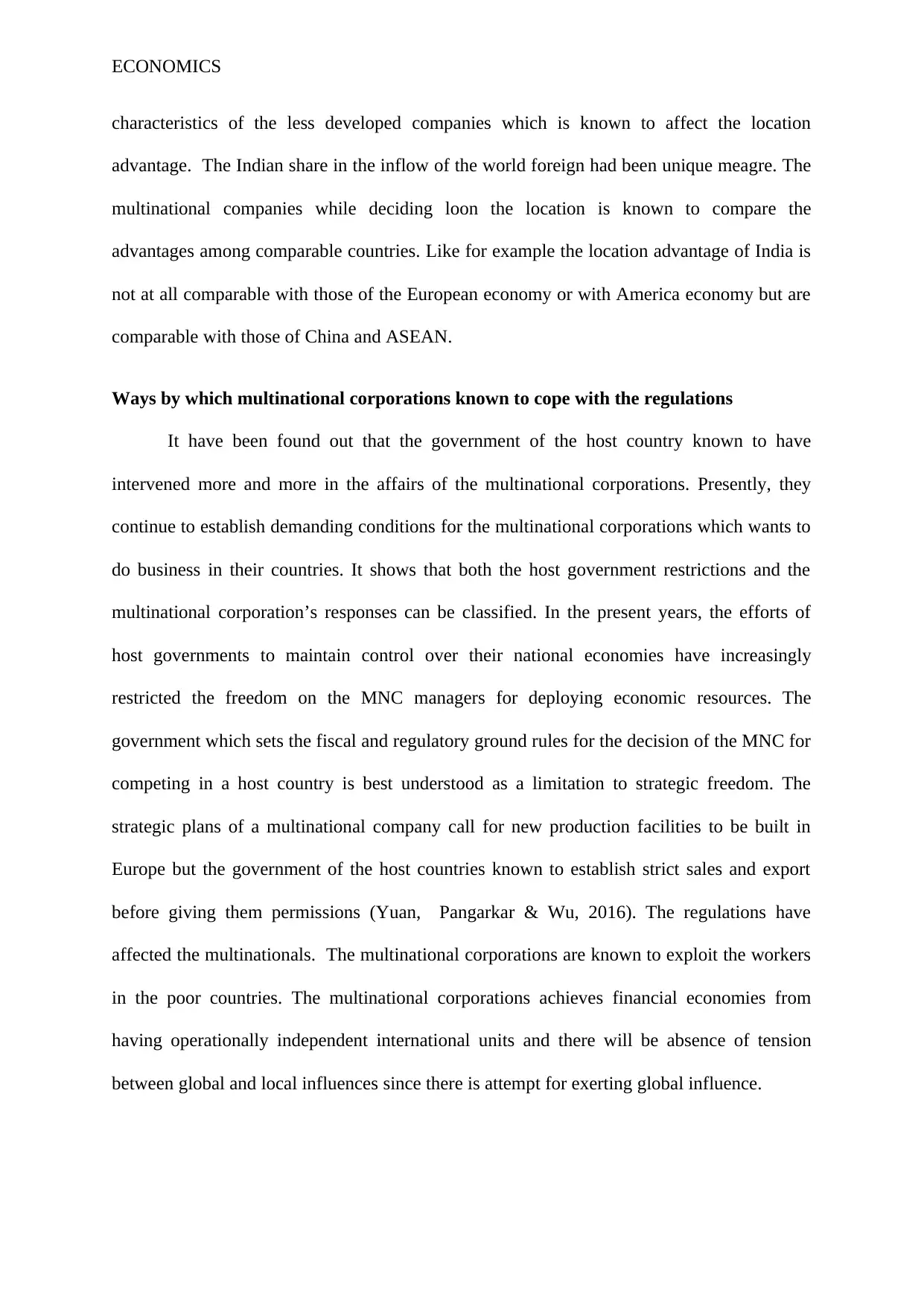
ECONOMICS
characteristics of the less developed companies which is known to affect the location
advantage. The Indian share in the inflow of the world foreign had been unique meagre. The
multinational companies while deciding loon the location is known to compare the
advantages among comparable countries. Like for example the location advantage of India is
not at all comparable with those of the European economy or with America economy but are
comparable with those of China and ASEAN.
Ways by which multinational corporations known to cope with the regulations
It have been found out that the government of the host country known to have
intervened more and more in the affairs of the multinational corporations. Presently, they
continue to establish demanding conditions for the multinational corporations which wants to
do business in their countries. It shows that both the host government restrictions and the
multinational corporation’s responses can be classified. In the present years, the efforts of
host governments to maintain control over their national economies have increasingly
restricted the freedom on the MNC managers for deploying economic resources. The
government which sets the fiscal and regulatory ground rules for the decision of the MNC for
competing in a host country is best understood as a limitation to strategic freedom. The
strategic plans of a multinational company call for new production facilities to be built in
Europe but the government of the host countries known to establish strict sales and export
before giving them permissions (Yuan, Pangarkar & Wu, 2016). The regulations have
affected the multinationals. The multinational corporations are known to exploit the workers
in the poor countries. The multinational corporations achieves financial economies from
having operationally independent international units and there will be absence of tension
between global and local influences since there is attempt for exerting global influence.
characteristics of the less developed companies which is known to affect the location
advantage. The Indian share in the inflow of the world foreign had been unique meagre. The
multinational companies while deciding loon the location is known to compare the
advantages among comparable countries. Like for example the location advantage of India is
not at all comparable with those of the European economy or with America economy but are
comparable with those of China and ASEAN.
Ways by which multinational corporations known to cope with the regulations
It have been found out that the government of the host country known to have
intervened more and more in the affairs of the multinational corporations. Presently, they
continue to establish demanding conditions for the multinational corporations which wants to
do business in their countries. It shows that both the host government restrictions and the
multinational corporation’s responses can be classified. In the present years, the efforts of
host governments to maintain control over their national economies have increasingly
restricted the freedom on the MNC managers for deploying economic resources. The
government which sets the fiscal and regulatory ground rules for the decision of the MNC for
competing in a host country is best understood as a limitation to strategic freedom. The
strategic plans of a multinational company call for new production facilities to be built in
Europe but the government of the host countries known to establish strict sales and export
before giving them permissions (Yuan, Pangarkar & Wu, 2016). The regulations have
affected the multinationals. The multinational corporations are known to exploit the workers
in the poor countries. The multinational corporations achieves financial economies from
having operationally independent international units and there will be absence of tension
between global and local influences since there is attempt for exerting global influence.
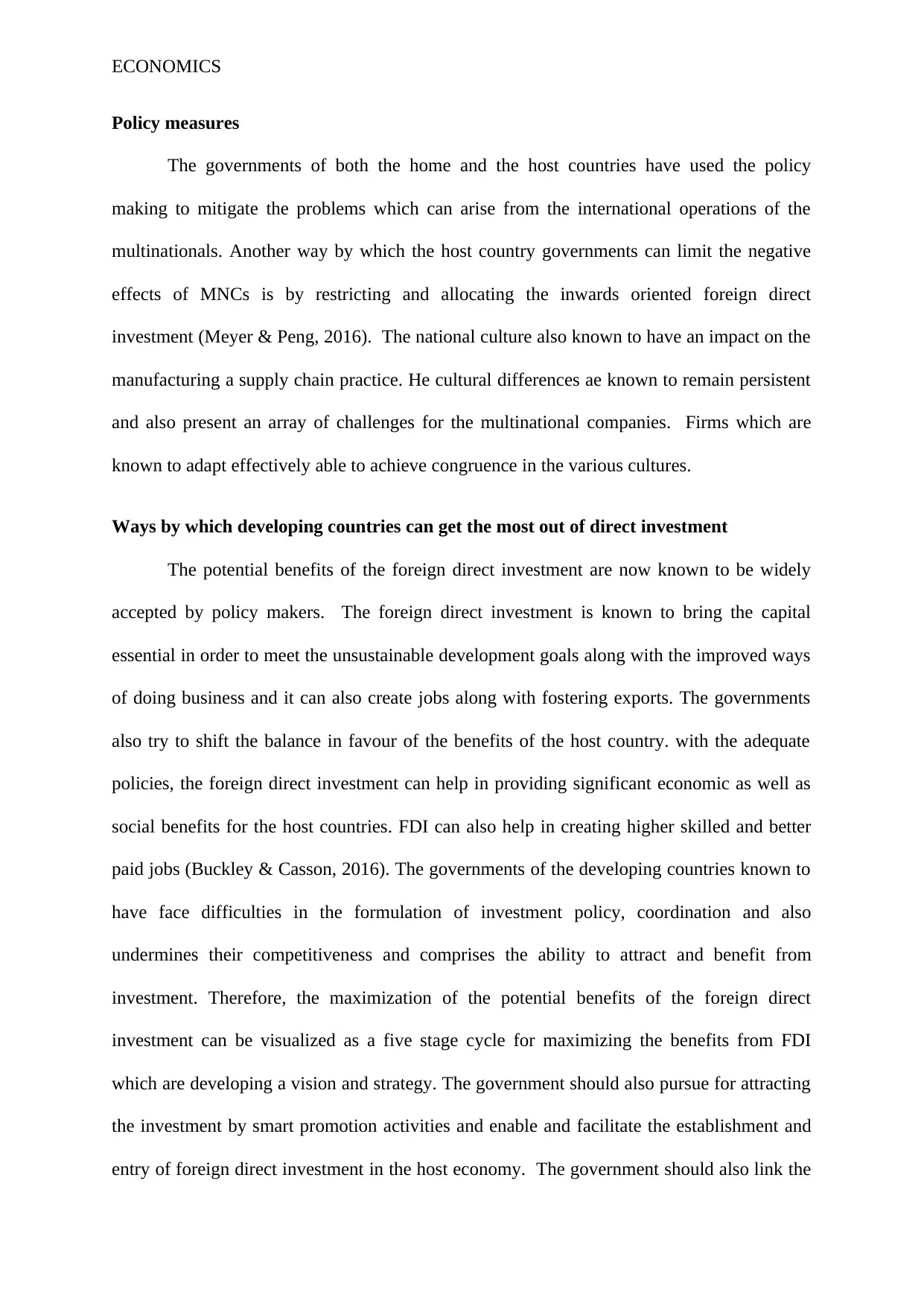
ECONOMICS
Policy measures
The governments of both the home and the host countries have used the policy
making to mitigate the problems which can arise from the international operations of the
multinationals. Another way by which the host country governments can limit the negative
effects of MNCs is by restricting and allocating the inwards oriented foreign direct
investment (Meyer & Peng, 2016). The national culture also known to have an impact on the
manufacturing a supply chain practice. He cultural differences ae known to remain persistent
and also present an array of challenges for the multinational companies. Firms which are
known to adapt effectively able to achieve congruence in the various cultures.
Ways by which developing countries can get the most out of direct investment
The potential benefits of the foreign direct investment are now known to be widely
accepted by policy makers. The foreign direct investment is known to bring the capital
essential in order to meet the unsustainable development goals along with the improved ways
of doing business and it can also create jobs along with fostering exports. The governments
also try to shift the balance in favour of the benefits of the host country. with the adequate
policies, the foreign direct investment can help in providing significant economic as well as
social benefits for the host countries. FDI can also help in creating higher skilled and better
paid jobs (Buckley & Casson, 2016). The governments of the developing countries known to
have face difficulties in the formulation of investment policy, coordination and also
undermines their competitiveness and comprises the ability to attract and benefit from
investment. Therefore, the maximization of the potential benefits of the foreign direct
investment can be visualized as a five stage cycle for maximizing the benefits from FDI
which are developing a vision and strategy. The government should also pursue for attracting
the investment by smart promotion activities and enable and facilitate the establishment and
entry of foreign direct investment in the host economy. The government should also link the
Policy measures
The governments of both the home and the host countries have used the policy
making to mitigate the problems which can arise from the international operations of the
multinationals. Another way by which the host country governments can limit the negative
effects of MNCs is by restricting and allocating the inwards oriented foreign direct
investment (Meyer & Peng, 2016). The national culture also known to have an impact on the
manufacturing a supply chain practice. He cultural differences ae known to remain persistent
and also present an array of challenges for the multinational companies. Firms which are
known to adapt effectively able to achieve congruence in the various cultures.
Ways by which developing countries can get the most out of direct investment
The potential benefits of the foreign direct investment are now known to be widely
accepted by policy makers. The foreign direct investment is known to bring the capital
essential in order to meet the unsustainable development goals along with the improved ways
of doing business and it can also create jobs along with fostering exports. The governments
also try to shift the balance in favour of the benefits of the host country. with the adequate
policies, the foreign direct investment can help in providing significant economic as well as
social benefits for the host countries. FDI can also help in creating higher skilled and better
paid jobs (Buckley & Casson, 2016). The governments of the developing countries known to
have face difficulties in the formulation of investment policy, coordination and also
undermines their competitiveness and comprises the ability to attract and benefit from
investment. Therefore, the maximization of the potential benefits of the foreign direct
investment can be visualized as a five stage cycle for maximizing the benefits from FDI
which are developing a vision and strategy. The government should also pursue for attracting
the investment by smart promotion activities and enable and facilitate the establishment and
entry of foreign direct investment in the host economy. The government should also link the
⊘ This is a preview!⊘
Do you want full access?
Subscribe today to unlock all pages.

Trusted by 1+ million students worldwide
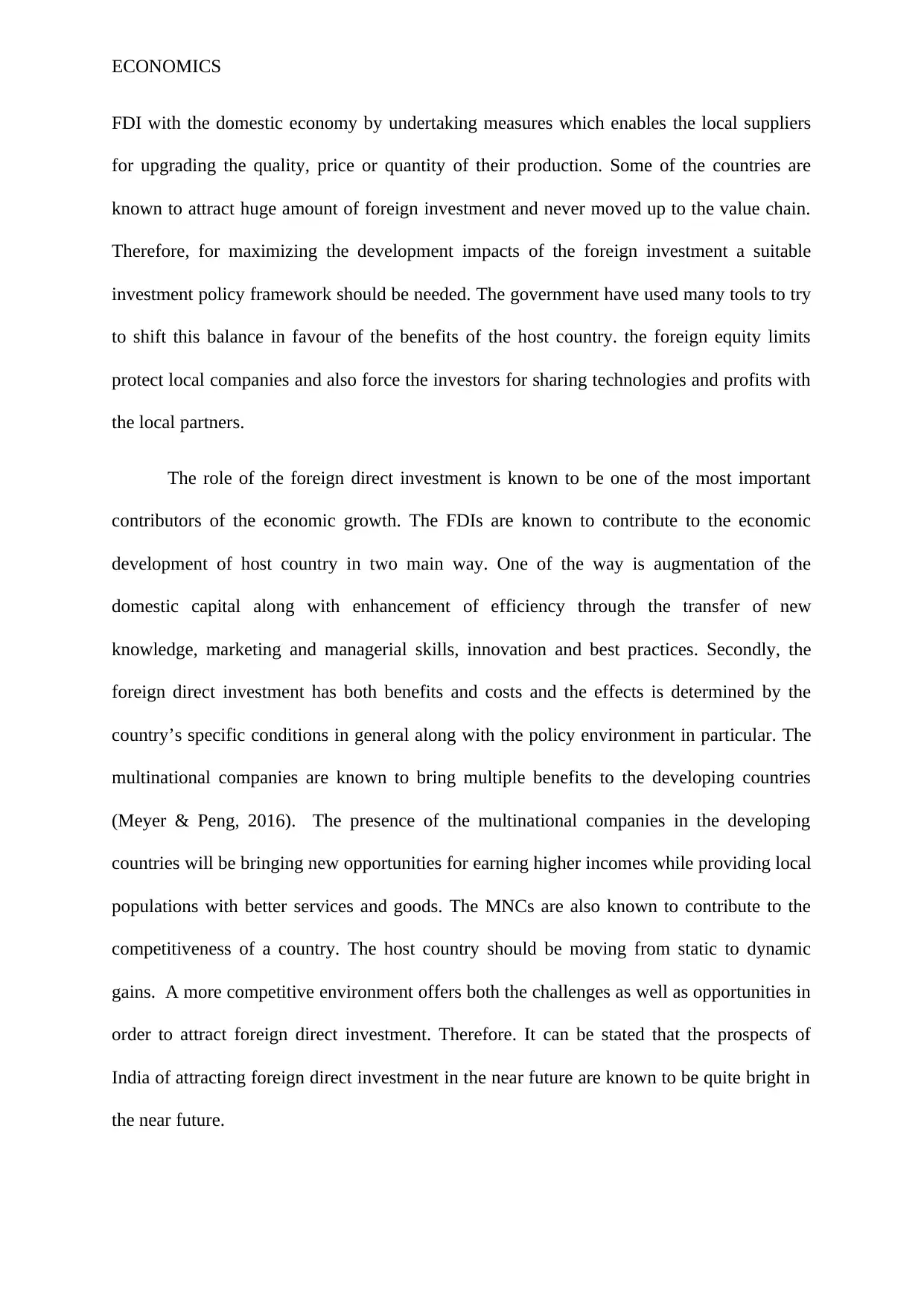
ECONOMICS
FDI with the domestic economy by undertaking measures which enables the local suppliers
for upgrading the quality, price or quantity of their production. Some of the countries are
known to attract huge amount of foreign investment and never moved up to the value chain.
Therefore, for maximizing the development impacts of the foreign investment a suitable
investment policy framework should be needed. The government have used many tools to try
to shift this balance in favour of the benefits of the host country. the foreign equity limits
protect local companies and also force the investors for sharing technologies and profits with
the local partners.
The role of the foreign direct investment is known to be one of the most important
contributors of the economic growth. The FDIs are known to contribute to the economic
development of host country in two main way. One of the way is augmentation of the
domestic capital along with enhancement of efficiency through the transfer of new
knowledge, marketing and managerial skills, innovation and best practices. Secondly, the
foreign direct investment has both benefits and costs and the effects is determined by the
country’s specific conditions in general along with the policy environment in particular. The
multinational companies are known to bring multiple benefits to the developing countries
(Meyer & Peng, 2016). The presence of the multinational companies in the developing
countries will be bringing new opportunities for earning higher incomes while providing local
populations with better services and goods. The MNCs are also known to contribute to the
competitiveness of a country. The host country should be moving from static to dynamic
gains. A more competitive environment offers both the challenges as well as opportunities in
order to attract foreign direct investment. Therefore. It can be stated that the prospects of
India of attracting foreign direct investment in the near future are known to be quite bright in
the near future.
FDI with the domestic economy by undertaking measures which enables the local suppliers
for upgrading the quality, price or quantity of their production. Some of the countries are
known to attract huge amount of foreign investment and never moved up to the value chain.
Therefore, for maximizing the development impacts of the foreign investment a suitable
investment policy framework should be needed. The government have used many tools to try
to shift this balance in favour of the benefits of the host country. the foreign equity limits
protect local companies and also force the investors for sharing technologies and profits with
the local partners.
The role of the foreign direct investment is known to be one of the most important
contributors of the economic growth. The FDIs are known to contribute to the economic
development of host country in two main way. One of the way is augmentation of the
domestic capital along with enhancement of efficiency through the transfer of new
knowledge, marketing and managerial skills, innovation and best practices. Secondly, the
foreign direct investment has both benefits and costs and the effects is determined by the
country’s specific conditions in general along with the policy environment in particular. The
multinational companies are known to bring multiple benefits to the developing countries
(Meyer & Peng, 2016). The presence of the multinational companies in the developing
countries will be bringing new opportunities for earning higher incomes while providing local
populations with better services and goods. The MNCs are also known to contribute to the
competitiveness of a country. The host country should be moving from static to dynamic
gains. A more competitive environment offers both the challenges as well as opportunities in
order to attract foreign direct investment. Therefore. It can be stated that the prospects of
India of attracting foreign direct investment in the near future are known to be quite bright in
the near future.
Paraphrase This Document
Need a fresh take? Get an instant paraphrase of this document with our AI Paraphraser
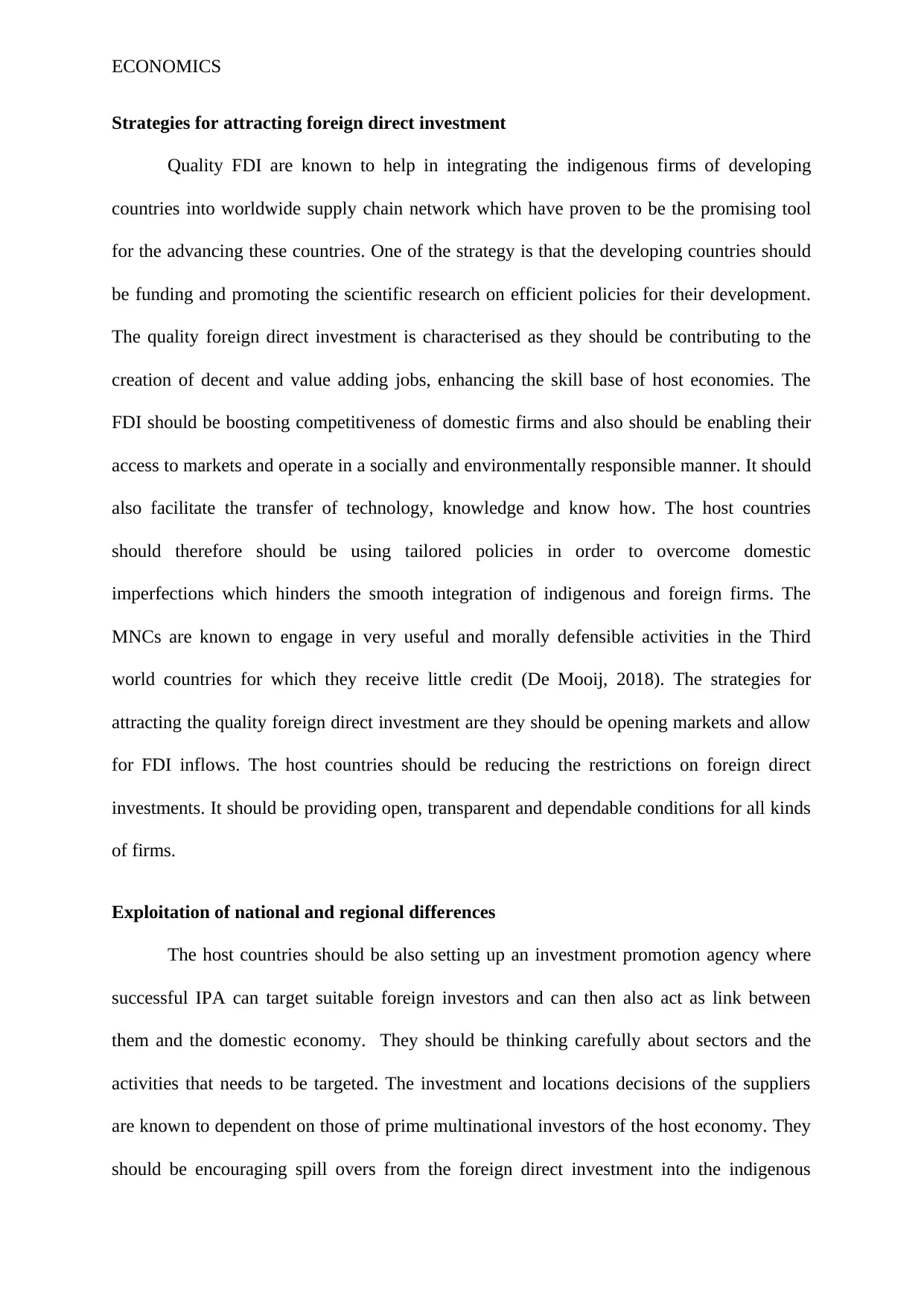
ECONOMICS
Strategies for attracting foreign direct investment
Quality FDI are known to help in integrating the indigenous firms of developing
countries into worldwide supply chain network which have proven to be the promising tool
for the advancing these countries. One of the strategy is that the developing countries should
be funding and promoting the scientific research on efficient policies for their development.
The quality foreign direct investment is characterised as they should be contributing to the
creation of decent and value adding jobs, enhancing the skill base of host economies. The
FDI should be boosting competitiveness of domestic firms and also should be enabling their
access to markets and operate in a socially and environmentally responsible manner. It should
also facilitate the transfer of technology, knowledge and know how. The host countries
should therefore should be using tailored policies in order to overcome domestic
imperfections which hinders the smooth integration of indigenous and foreign firms. The
MNCs are known to engage in very useful and morally defensible activities in the Third
world countries for which they receive little credit (De Mooij, 2018). The strategies for
attracting the quality foreign direct investment are they should be opening markets and allow
for FDI inflows. The host countries should be reducing the restrictions on foreign direct
investments. It should be providing open, transparent and dependable conditions for all kinds
of firms.
Exploitation of national and regional differences
The host countries should be also setting up an investment promotion agency where
successful IPA can target suitable foreign investors and can then also act as link between
them and the domestic economy. They should be thinking carefully about sectors and the
activities that needs to be targeted. The investment and locations decisions of the suppliers
are known to dependent on those of prime multinational investors of the host economy. They
should be encouraging spill overs from the foreign direct investment into the indigenous
Strategies for attracting foreign direct investment
Quality FDI are known to help in integrating the indigenous firms of developing
countries into worldwide supply chain network which have proven to be the promising tool
for the advancing these countries. One of the strategy is that the developing countries should
be funding and promoting the scientific research on efficient policies for their development.
The quality foreign direct investment is characterised as they should be contributing to the
creation of decent and value adding jobs, enhancing the skill base of host economies. The
FDI should be boosting competitiveness of domestic firms and also should be enabling their
access to markets and operate in a socially and environmentally responsible manner. It should
also facilitate the transfer of technology, knowledge and know how. The host countries
should therefore should be using tailored policies in order to overcome domestic
imperfections which hinders the smooth integration of indigenous and foreign firms. The
MNCs are known to engage in very useful and morally defensible activities in the Third
world countries for which they receive little credit (De Mooij, 2018). The strategies for
attracting the quality foreign direct investment are they should be opening markets and allow
for FDI inflows. The host countries should be reducing the restrictions on foreign direct
investments. It should be providing open, transparent and dependable conditions for all kinds
of firms.
Exploitation of national and regional differences
The host countries should be also setting up an investment promotion agency where
successful IPA can target suitable foreign investors and can then also act as link between
them and the domestic economy. They should be thinking carefully about sectors and the
activities that needs to be targeted. The investment and locations decisions of the suppliers
are known to dependent on those of prime multinational investors of the host economy. They
should be encouraging spill overs from the foreign direct investment into the indigenous
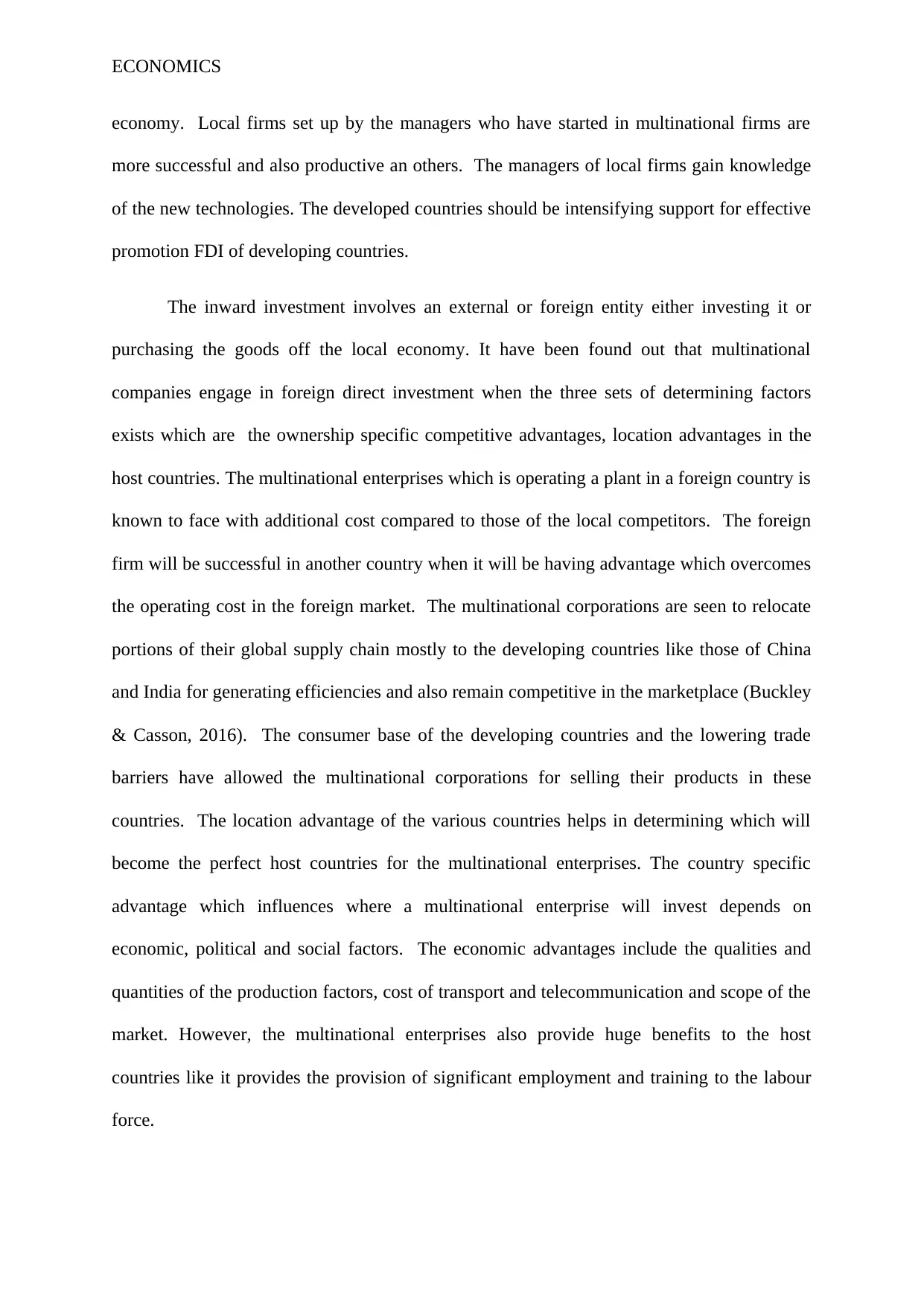
ECONOMICS
economy. Local firms set up by the managers who have started in multinational firms are
more successful and also productive an others. The managers of local firms gain knowledge
of the new technologies. The developed countries should be intensifying support for effective
promotion FDI of developing countries.
The inward investment involves an external or foreign entity either investing it or
purchasing the goods off the local economy. It have been found out that multinational
companies engage in foreign direct investment when the three sets of determining factors
exists which are the ownership specific competitive advantages, location advantages in the
host countries. The multinational enterprises which is operating a plant in a foreign country is
known to face with additional cost compared to those of the local competitors. The foreign
firm will be successful in another country when it will be having advantage which overcomes
the operating cost in the foreign market. The multinational corporations are seen to relocate
portions of their global supply chain mostly to the developing countries like those of China
and India for generating efficiencies and also remain competitive in the marketplace (Buckley
& Casson, 2016). The consumer base of the developing countries and the lowering trade
barriers have allowed the multinational corporations for selling their products in these
countries. The location advantage of the various countries helps in determining which will
become the perfect host countries for the multinational enterprises. The country specific
advantage which influences where a multinational enterprise will invest depends on
economic, political and social factors. The economic advantages include the qualities and
quantities of the production factors, cost of transport and telecommunication and scope of the
market. However, the multinational enterprises also provide huge benefits to the host
countries like it provides the provision of significant employment and training to the labour
force.
economy. Local firms set up by the managers who have started in multinational firms are
more successful and also productive an others. The managers of local firms gain knowledge
of the new technologies. The developed countries should be intensifying support for effective
promotion FDI of developing countries.
The inward investment involves an external or foreign entity either investing it or
purchasing the goods off the local economy. It have been found out that multinational
companies engage in foreign direct investment when the three sets of determining factors
exists which are the ownership specific competitive advantages, location advantages in the
host countries. The multinational enterprises which is operating a plant in a foreign country is
known to face with additional cost compared to those of the local competitors. The foreign
firm will be successful in another country when it will be having advantage which overcomes
the operating cost in the foreign market. The multinational corporations are seen to relocate
portions of their global supply chain mostly to the developing countries like those of China
and India for generating efficiencies and also remain competitive in the marketplace (Buckley
& Casson, 2016). The consumer base of the developing countries and the lowering trade
barriers have allowed the multinational corporations for selling their products in these
countries. The location advantage of the various countries helps in determining which will
become the perfect host countries for the multinational enterprises. The country specific
advantage which influences where a multinational enterprise will invest depends on
economic, political and social factors. The economic advantages include the qualities and
quantities of the production factors, cost of transport and telecommunication and scope of the
market. However, the multinational enterprises also provide huge benefits to the host
countries like it provides the provision of significant employment and training to the labour
force.
⊘ This is a preview!⊘
Do you want full access?
Subscribe today to unlock all pages.

Trusted by 1+ million students worldwide
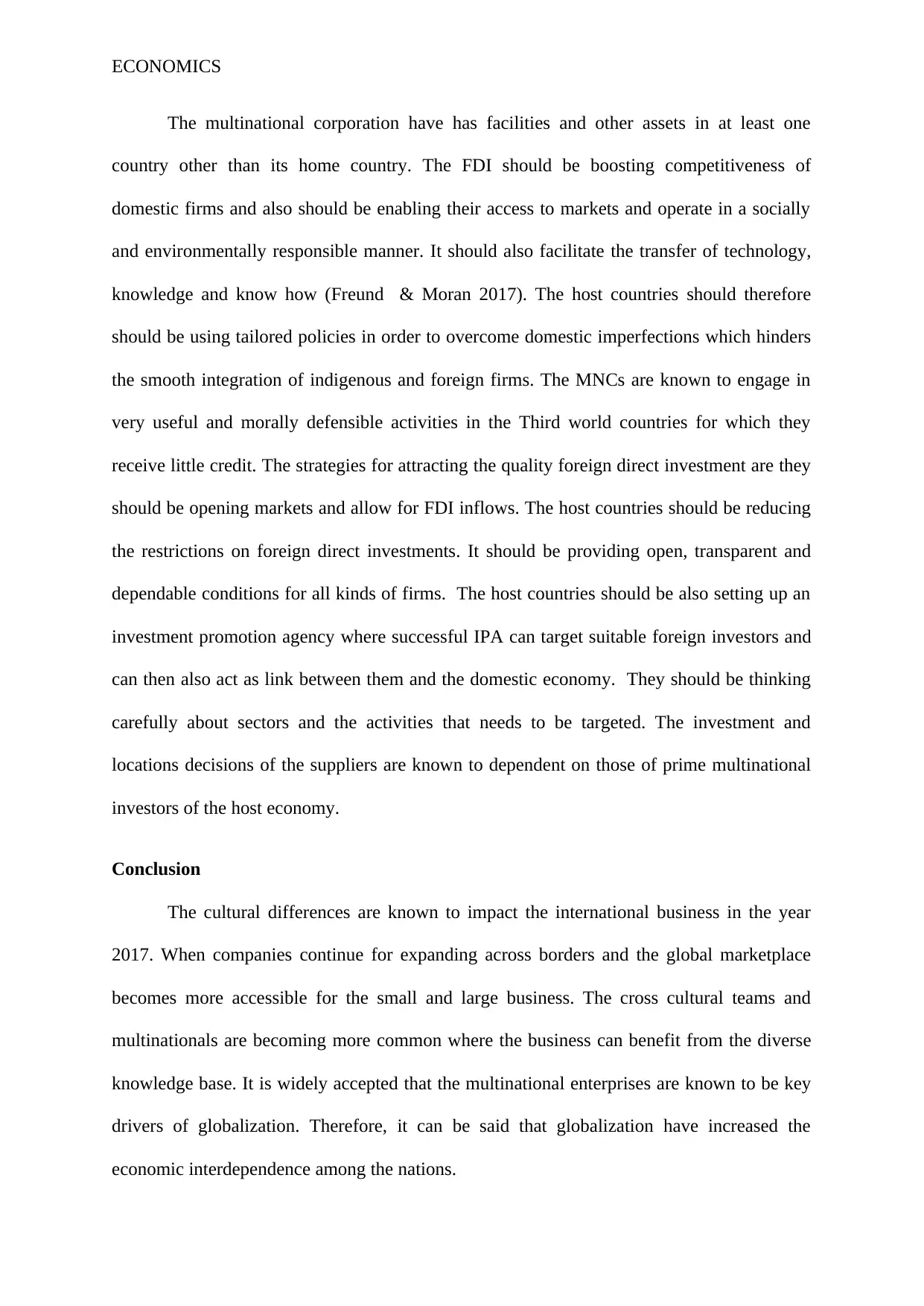
ECONOMICS
The multinational corporation have has facilities and other assets in at least one
country other than its home country. The FDI should be boosting competitiveness of
domestic firms and also should be enabling their access to markets and operate in a socially
and environmentally responsible manner. It should also facilitate the transfer of technology,
knowledge and know how (Freund & Moran 2017). The host countries should therefore
should be using tailored policies in order to overcome domestic imperfections which hinders
the smooth integration of indigenous and foreign firms. The MNCs are known to engage in
very useful and morally defensible activities in the Third world countries for which they
receive little credit. The strategies for attracting the quality foreign direct investment are they
should be opening markets and allow for FDI inflows. The host countries should be reducing
the restrictions on foreign direct investments. It should be providing open, transparent and
dependable conditions for all kinds of firms. The host countries should be also setting up an
investment promotion agency where successful IPA can target suitable foreign investors and
can then also act as link between them and the domestic economy. They should be thinking
carefully about sectors and the activities that needs to be targeted. The investment and
locations decisions of the suppliers are known to dependent on those of prime multinational
investors of the host economy.
Conclusion
The cultural differences are known to impact the international business in the year
2017. When companies continue for expanding across borders and the global marketplace
becomes more accessible for the small and large business. The cross cultural teams and
multinationals are becoming more common where the business can benefit from the diverse
knowledge base. It is widely accepted that the multinational enterprises are known to be key
drivers of globalization. Therefore, it can be said that globalization have increased the
economic interdependence among the nations.
The multinational corporation have has facilities and other assets in at least one
country other than its home country. The FDI should be boosting competitiveness of
domestic firms and also should be enabling their access to markets and operate in a socially
and environmentally responsible manner. It should also facilitate the transfer of technology,
knowledge and know how (Freund & Moran 2017). The host countries should therefore
should be using tailored policies in order to overcome domestic imperfections which hinders
the smooth integration of indigenous and foreign firms. The MNCs are known to engage in
very useful and morally defensible activities in the Third world countries for which they
receive little credit. The strategies for attracting the quality foreign direct investment are they
should be opening markets and allow for FDI inflows. The host countries should be reducing
the restrictions on foreign direct investments. It should be providing open, transparent and
dependable conditions for all kinds of firms. The host countries should be also setting up an
investment promotion agency where successful IPA can target suitable foreign investors and
can then also act as link between them and the domestic economy. They should be thinking
carefully about sectors and the activities that needs to be targeted. The investment and
locations decisions of the suppliers are known to dependent on those of prime multinational
investors of the host economy.
Conclusion
The cultural differences are known to impact the international business in the year
2017. When companies continue for expanding across borders and the global marketplace
becomes more accessible for the small and large business. The cross cultural teams and
multinationals are becoming more common where the business can benefit from the diverse
knowledge base. It is widely accepted that the multinational enterprises are known to be key
drivers of globalization. Therefore, it can be said that globalization have increased the
economic interdependence among the nations.
Paraphrase This Document
Need a fresh take? Get an instant paraphrase of this document with our AI Paraphraser

ECONOMICS

ECONOMICS
Reference list
Almond, P., Gonzalez, M. C., Lavelle, J., & Murray, G. (2017). The local in the global:
regions, employment systems and multinationals. Industrial Relations Journal, 48(2),
115-132.
Almond, P., Gonzalez, M. C., Lavelle, J., & Murray, G. (2017). The local in the global:
regions, employment systems and multinationals. Industrial Relations Journal, 48(2),
115-132.
Andersson, U., Dasí, Á., Mudambi, R., & Pedersen, T. (2016). Technology, innovation and
knowledge: The importance of ideas and international connectivity. Journal of World
Business, 51(1), 153-162.
Averchenkova, A., Crick, F., Kocornik‐Mina, A., Leck, H., & Surminski, S. (2016).
Multinational and large national corporations and climate adaptation: are we asking
the right questions? A review of current knowledge and a new research
perspective. Wiley Interdisciplinary Reviews: Climate Change, 7(4), 517-536.
Boddewyn, J. J. (2015). Political aspects of MNE theory. In The Eclectic Paradigm (pp. 85-
110). Palgrave Macmillan, London.
Buckley, P. J., & Casson, M. (2016). The future of the multinational enterprise. Springer.
De Mooij, M. (2018). Global marketing and advertising: Understanding cultural paradoxes.
SAGE Publications Limited.
Deresky, H. (2017). International management: Managing across borders and cultures.
Pearson Education India.
Freund, C., & Moran, T. (2017). Multinational investors as export superstars: How emerging-
market governments can reshape comparative advantage.
Reference list
Almond, P., Gonzalez, M. C., Lavelle, J., & Murray, G. (2017). The local in the global:
regions, employment systems and multinationals. Industrial Relations Journal, 48(2),
115-132.
Almond, P., Gonzalez, M. C., Lavelle, J., & Murray, G. (2017). The local in the global:
regions, employment systems and multinationals. Industrial Relations Journal, 48(2),
115-132.
Andersson, U., Dasí, Á., Mudambi, R., & Pedersen, T. (2016). Technology, innovation and
knowledge: The importance of ideas and international connectivity. Journal of World
Business, 51(1), 153-162.
Averchenkova, A., Crick, F., Kocornik‐Mina, A., Leck, H., & Surminski, S. (2016).
Multinational and large national corporations and climate adaptation: are we asking
the right questions? A review of current knowledge and a new research
perspective. Wiley Interdisciplinary Reviews: Climate Change, 7(4), 517-536.
Boddewyn, J. J. (2015). Political aspects of MNE theory. In The Eclectic Paradigm (pp. 85-
110). Palgrave Macmillan, London.
Buckley, P. J., & Casson, M. (2016). The future of the multinational enterprise. Springer.
De Mooij, M. (2018). Global marketing and advertising: Understanding cultural paradoxes.
SAGE Publications Limited.
Deresky, H. (2017). International management: Managing across borders and cultures.
Pearson Education India.
Freund, C., & Moran, T. (2017). Multinational investors as export superstars: How emerging-
market governments can reshape comparative advantage.
⊘ This is a preview!⊘
Do you want full access?
Subscribe today to unlock all pages.

Trusted by 1+ million students worldwide
1 out of 14
Related Documents
Your All-in-One AI-Powered Toolkit for Academic Success.
+13062052269
info@desklib.com
Available 24*7 on WhatsApp / Email
![[object Object]](/_next/static/media/star-bottom.7253800d.svg)
Unlock your academic potential
Copyright © 2020–2026 A2Z Services. All Rights Reserved. Developed and managed by ZUCOL.





